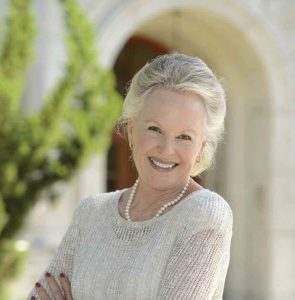 It’s safe to say that no Pomona faculty member has ever been more beloved among students and alumni than Emerita Professor of English Martha Andresen Wilder, who died on March 24 from multiple myeloma at the age of 74. Over the 34 years of her Pomona career, she was honored by the students themselves seven times with the coveted Wig Award for Excellence in Teaching, setting a record in the 60-plus-year history of the award that is unlikely ever to be surpassed. If she hadn’t been ineligible for four years following each win, she probably would have garnered many more.
It’s safe to say that no Pomona faculty member has ever been more beloved among students and alumni than Emerita Professor of English Martha Andresen Wilder, who died on March 24 from multiple myeloma at the age of 74. Over the 34 years of her Pomona career, she was honored by the students themselves seven times with the coveted Wig Award for Excellence in Teaching, setting a record in the 60-plus-year history of the award that is unlikely ever to be surpassed. If she hadn’t been ineligible for four years following each win, she probably would have garnered many more.
Former students remember her for her contagious enthusiasm, her love and thorough knowledge of the material, her always strikingly creative presentation and her deep warmth and kindness. “I can attest to the most luminous, powerful, soul-searching teaching I have ever seen,” one student commented. “She awakens the heart,” said another. “She gives the students a lesson plus the reasons for taking that lesson to heart.”
She is remembered and revered in particular for her legendary Shakespeare classes, in which she was known for her “page to stage” approach, urging her students to experience the Bard’s genius from every possible perspective—as readers, scholars, spectators and actors.
Inspired by the phrase “only connect,” the epigraph from the E.M. Forster novel, Howard’s End, she sought to make the works of Shakespeare relevant to the lives of her students. She would often take an ordinary phrase, like the first line from Hamlet—“Who’s there?”—and lead her listeners through the process of parsing its many levels of meaning, transforming it into something profound, personal and unforgettable. She described the core of her approach as asking students not only for close textual and linguistic analysis of the Bard’s words, but also “to ‘take another’s part,’ to understand and inhabit the Other, always a leap of empathetic, theatrical and moral imagination.”
As each semester came to a close, members of the college community would keep an eye out for her class’s signature culminating exercise—a series of pop-up performances in which groups of students would present a scene from one of the plays, staged in a site of their choosing—from the likely (dormitory balcony) to the unlikely (among the dumpsters behind a dining hall). Many of her former students have called the process of interpreting, conceptualizing and performing a scene from one of Shakespeare’s plays, under her inspiration, one of the seminal experiences of their college career.
Referring to the fact that her Shakespeare classes were always waitlisted as students vied for the privilege of studying with her, Emeritus Professor of English Thomas Pinney once dubbed her “the Pied Piper of the Pomona College English Department,” remarking that, “we joke that she’d have to turn away students if she were teaching the minor poems of John Lidgate.”
A noted scholar of Renaissance literature with a special love for and expertise in the works of the Bard, she was the author of numerous published articles in scholarly journals and was a consultant for such projects as the BBC/TV series “The Shakespeare Plays” and the reconstruction of the Globe Theatre on its original London site. In addition to her famous Shakespeare classes, she taught a range of other courses through the years, including Milton, Major British Authors and the English Lyric Before 1700.
Born March 7, 1944 in Minneapolis, Minnesota to Karl and Elizabeth Andresen, she graduated from the University of Minnesota, summa cum laude and Phi Beta Kappa; and went on to receive her master’s degree and doctorate in English from Yale University. She came to Pomona in 1972 after a two-year sojourn on the faculty of the University of Pittsburgh. For the final 16 years of her career at Pomona, she held the distinguished title of Phebe Estelle Spalding Professor of English.
In 1992, she was chosen by the Council for Advancement and Support of Education to be the California Professor of the Year and by Baylor University as the recipient of the Robert Foster Cherry Award for Great Teaching. In 2000 she was elected a Fellow of the Radcliffe Center for Intellectual Renewal.
A compelling public speaker, Martha was sought after by groups across the country and over the years presented well over 500 public lectures. She was in demand for alumni events throughout her tenure and after her retirement. Although her subjects were drawn primarily from Shakespeare and his plays, three of the talks she gave in the last years of her life illustrate her remarkable range: at the LA Arboretum, “Shakespeare’s Gardens and Green Worlds;” for the American Association of University Women, “Isn’t Wonder Woman Still Among Us?” inspired by her reading of Jill Lepore’s recent history; and at a Gala for the City of Hope Foundation, a personal meditation on the transformation and transmutation she had experienced as a patient, and the way she had come to understand it and to take solace from Shakespeare’s explorations of those states.
